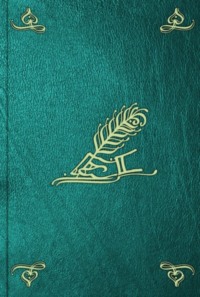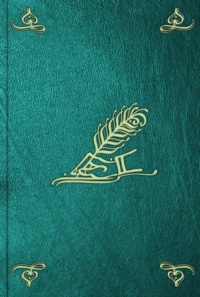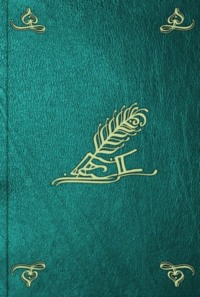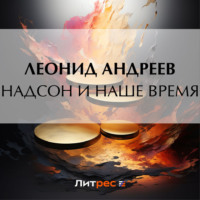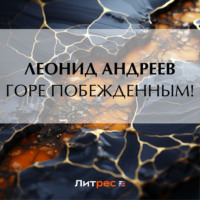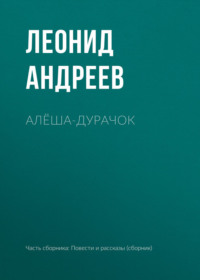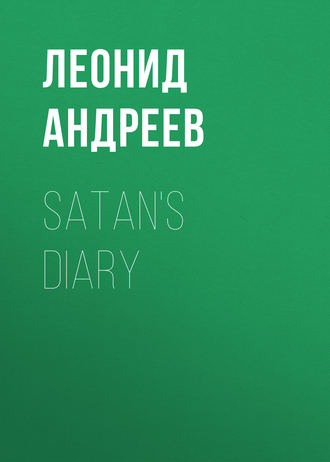 полная версия
полная версияSatan's Diary
Think of it: for two days, after leaving New York, I suffered from seasickness! This sounds queer to you, who are accustomed to wallow in your own dirt? Well, I – I have also wallowed in it but it was not queer at all. I only smiled once in thinking that it was not I, but Wondergood, and said:
“Roll on, Wondergood, roll on!”
There is another question to which you probably want an answer: Why did I come to this earth and accept such an unprofitable exchange: to be transformed from Satan, “the mighty, immortal chieftain and ruler” into you? I am tired of seeking words that cannot be found. I will answer you in English, French, Italian or German – languages we both understand well. I have grown lonesome in Hell and I have come upon the earth to lie and play.
You know what ennui is. And as for falsehood, you know it well too. And as for play – you can judge it to a certain extent by your own theaters and celebrated actors. Perhaps you yourself are playing a little rôle in Parliament, at home, or in your church. If you are, you may understand something of the satisfaction of play. And, if in addition, you are familiar with the multiplication table, then multiply the delight and joy of play into any considerable figure and you will get an idea of My enjoyment, of My play. No, imagine that you are an ocean wave, which plays eternally and lives only in play – take this wave, for example, which I see outside the porthole now and which wants to lift our “Atlantic”…but, here I am again seeking words and comparisons!
I simply want to play. At present I am still an unknown actor, a modest débutante, but I hope to become no less a celebrity than your own Garrick or Aldrich, after I have played what I please. I am proud, selfish and even, if you please, vain and boastful. You know what vanity is, when you crave the praise and plaudits even of a fool? Then I entertain the brazen idea that I am a genius. Satan is known for his brazenness. And so, imagine, that I have grown weary of Hell where all these hairy and horny rogues play and lie no worse than I do, and that I am no longer satisfied with the laurels of Hell, in which I but perceive no small measure of base flattery and downright stupidity. But I have heard of you, my earthly friend; I have heard that you are wise, tolerably honest, properly incredulous, responsive to the problems of eternal art and that you yourself play and lie so badly that you might appreciate the playing of others: not in vain have you so many great actors. And so I have come. You understand?
My stage is the earth and the nearest scene for which I am now bound is Rome, the Eternal City, as it is called here, in your profound conception of eternity and other simple matters. I have not yet selected my company (would you not like to join it?). But I believe that Fate and Chance, to whom I am now subservient, like all your earthly things, will realize my unselfish motives and will send me worthy partners. Old Europe is so rich in talents! I believe that I shall find a keen and appreciative audience in Europe, too. I confess that I first thought of going to the East, which some of my compatriots made their scene of activity some time ago with no small measure of success, but the East is too credulous and is inclined too much to poison and the ballet. Its gods are ludicrous. The East still reeks too much of hairy animals. Its lights and shadows are barbarously crude and too bright to make it worth while for a refined artist as I am to go into that crowded, foul circus tent. Ah, my friend, I am so vain that I even begin this Diary not without the secret intention of impressing you with my modesty in the rôle of seeker of words and comparisons. I hope you will not take advantage of my frankness and cease believing me.
Are there any other questions? Of the play itself I have no clear idea yet. It will be composed by the same impresario who will assemble the actors —Fate. My modest rôle, as a beginning, will be that of a man who so loves his fellow beings that he is willing to give them everything, his soul and his money. Of course, you have not forgotten that I am a billionaire? I have three billion dollars. Sufficient – is it not? – for one spectacular performance. One more detail before I conclude this page.
I have with me, sharing my fate, a certain Irwin Toppi, my secretary, – a most worthy person in his black frock coat and silk top hat, his long nose resembling an unripened pear and his smoothly shaven, pastor-like face. I would not be surprised to find a prayer book in his pocket. My Toppi came upon this earth from there, i.e. from Hell and by the same means as mine: he, too, assumed the human form and, it seems, quite successfully – the rogue is entirely immune from seasickness. However to be seasick one must have some brains and my Toppi is unusually stupid – even for this earth. Besides, he is impolite and ventures to offer advice. I am rather sorry that out of our entire wealth of material I did not select some one better, but I was impressed by his honesty and partial familiarity with the earth: it seemed more pleasant to enter upon this little jaunt with an experienced comrade. Quite a long time ago he once before assumed the human form and was so taken by religious sentiments that – think of it! – he entered a Franciscan monastery, lived there to a ripe old age and died peacefully under the name of Brother Vincent. His ashes became the object of veneration for believers – not a bad career for a fool of a devil. No sooner did he enter upon this trip with Me than he began to sniff about for incense – an incurable habit! You will probably like him.
And now enough. Get thee hence, my friend. I wish to be alone. Your shallow reflection upon this wall wears upon me. I wish to be alone or only with this Wondergood who has leased his abode to Me and seems to have gotten the best of Me somehow or other. The sea is calm. I am no longer nauseated but I am afraid of something. I am afraid! I fear this darkness which they call night and descends upon the ocean: here, in the cabin there is still some light, but there, on deck, there is terrible darkness, and My eyes are quite helpless. These silly reflectors – they are worthless. They are able to reflect things by day but in the darkness they lose even this miserable power. Of course I shall get used to the darkness. I have already grown used to many things. But just now I am ill at ease and it is horrible to think that the mere turn of a key obsesses me with this blind ever present darkness. Whence does it come?
And how brave men are with their dim reflectors: they see nothing and simply say: it is dark here, we must make a light! Then they themselves put it out and go to sleep. I regard these braves with a kind of cold wonder and I am seized with admiration. Or must one possess a great mind to appreciate horror, like Mine? You are not such a coward, Wondergood. You always bore the reputation of being a hardened man and a man of experience!
There is one moment in the process of my assumption of the human form that I cannot recollect without horror. That was when for the first time I heard the beating of My heart. This regular, loud, metronome-like sound, which speaks as much of death as of life, filled me with the hitherto inexperienced sensation of horror. Men are always quarrelling about accounts, but how can they carry in their breasts this counting machine, registering with the speed of a magician the fleeting seconds of life?
At first I wanted to shout and to run back below, before I could grow accustomed to life, but here I looked at Toppi: this new-born fool was calmly brushing his top hat with the sleeve of his frock coat. I broke out into laughter and cried:
“Toppi, the brush!”
We both brushed ourselves while the counting machine in my breast was computing the seconds and, it seemed to me, adding on a few for good measure. Finally, hearing its brazen beating, I thought I might not have time enough to finish my toillette. I have been in a great hurry for some time. Just what it was I would not be able to complete I did not know, but for two days I was in a mad rush to eat and drink and even sleep: the counting machine was beating away while I lay in slumber!
But I never rush now. I know that I will manage to get through and my moments seem inexhaustible. But the little machine keeps on beating just the same, like a drunken soldier at a drum. And how about the very moments it is using up now. Are they to be counted as equal to the great ones? Then I say it is all a fraud and I protest as a honest citizen of the United States and as a merchant.
I do not feel well. Yet I would not repulse even a friend at this moment. Ah! In all the universe I am alone!
February 7, 1914.Rome, Hotel “Internationale.”I am driven mad whenever I am compelled to seize the club of a policeman to bring order in my brain: facts, to the right! thoughts, to the left! moods, to the rear – clear the road for His Highness, Conscience, which barely moves about upon its stilts. I am compelled to do this: otherwise there would be a riot, an abrecadebra, chaos. And so I call you to order, gentleman – facts and lady-thoughts. I begin.
Night. Darkness. The air is balmy. There is a pleasant fragrance. Toppi is enchanted. We are in Italy. Our speeding train is approaching Rome. We are enjoying our soft couches when, suddenly, crash! Everything flies to the devil: the train has gone out of its mind. It is wrecked. I confess without shame that I am not very brave, that I was seized with terror and seemed to have lost consciousness. The lights were extinguished and with much labor I crawled out of the corner into which I had been hurled. I seemed to have forgotten the exit. There were only walls and corners. I felt something stinging and beating at Me, and all about nothing but darkness. Suddenly I felt a body beneath my feet. I stepped right upon the face. Only afterwards did I discover that the body was that of George, my lackey, killed outright. I shouted and my obliging Toppi came to my aid: he seized me by the arm and led me to an open window, as both exits had been barricaded by fragments of the car and baggage. I leaped out, but Toppi lingered behind. My knees were trembling. I was groaning but still he failed to appear. I shouted. Suddenly he reappeared at the window and shouted back:
“What are you crying about? I am looking for our hats and your portfolio.”
A few moments later he returned and handed me my hat. He himself had his silk top hat on and carried the portfolio. I shook with laughter and said:
“Young man, you have forgotten the umbrella!”
But the old buffoon has no sense of humor. He replied seriously:
“I do not carry an umbrella. And do you know, our George is dead and so is the chef.”
So, this fallen carcass which has no feelings and upon whose face one steps with impunity is our George! I was again seized with terror and suddenly my ears were pierced with groans, wild shrieks, whistlings and cries! All the sounds wherewith these braves wail when they are crushed. At first I was deafened. I heard nothing. The cars caught fire. The flames and smoke shot up into the air. The wounded began to groan and, without waiting for the flesh to roast, I darted like a flash into the field. What a leap!
Fortunately the low hills of the Roman Campagna are very convenient for this kind of sport and I was no means behind in the line of runners. When, out of breath, I hurled myself upon the ground, it was no longer possible to hear or see anything. Only Toppi was approaching. But what a terrible thing this heart is! My face touched the earth. The earth was cool, firm, calm and here I liked it. It seemed as if it had restored my breath and put my heart back into its place. I felt easier. The stars above were calm. There was nothing for them to get excited about. They were not concerned with things below. They merely shine in triumph. That is their eternal ball. And at this brilliant ball the earth, clothed in darkness, appeared as an enchanting stranger in a black mask. (Not at all badly expressed? I trust that you, my reader, will be pleased: my style and my manners are improving!)
I kissed Toppi in the darkness. I always kiss those I like in the darkness. And I said:
“You are carrying your human form, Toppi, very well. I respect you. But what are we to do now? Those lights yonder in the sky – they are the lights of Rome. But they are too far away!”
“Yes, it is Rome,” affirmed Toppi, and raised his hand: “do you hear whistling?”
From somewhere in the distance came the long-drawn, piercing, shrieking of locomotives. They were sounding the alarm.
“Yes, they are whistling,” I said and laughed.
“They are whistling!” repeated Toppi smiling. He never laughs.
But here again I began to feel uncomfortable. I was cold, lonely, quivering. In my feet there was still the sensation of treading upon corpses. I wanted to shake myself like a dog after a bath. You must understand me: it was the first time that I had seen and felt your corpse, my dear reader, and if you pardon me, it did not appeal to me at all. Why did it not protest when I walked over its face? George had such a beautiful young face and he carried himself with much dignity. Remember your face, too, may be trod upon. And will you, too, remain submissive?
We did not proceed to Rome but went instead in search of the nearest night lodging. We walked long. We grew tired. We longed to drink, oh, how we longed to drink! And now, permit me to present to you my new friend, Signor Thomas Magnus and his beautiful daughter, Maria.
At first we observed the faint flicker of a light. As we approached nearer we found a little house, its white walls gleaming through a thicket of dark cypress trees and shrubbery. There was a light in one of the windows, the rest were barricaded with shutters. The house had a stone fence, an iron gate, strong doors. And – silence. At first glance it all looked suspicious. Toppi knocked. Again silence. I knocked. Still silence. Finally there came a gruff voice, asking from behind the iron door:
“Who are you? What do you want?”
Hardly mumbling with his parched tongue, my brave Toppi narrated the story of the catastrophe and our escape. He spoke at length and then came the click of a lock and the door was opened. Following behind our austere and silent stranger we entered the house, passed through several dark and silent rooms, walked up a flight of creaking stairs into a brightly lighted room, apparently the stranger’s workroom. There was much light, many books, with one open beneath a low lamp shaded by a simple, green globe. We had not noticed this light in the field. But what astonished me was the silence of the house. Despite the rather early hour not a move, not a sound, not a voice was to be heard.
“Have a seat.”
We sat down and Toppi, now almost in pain, began again to narrate his story. But the strange host interrupted him:
“Yes, a catastrophe. They often occur on our roads. Were there many victims?”
Toppi continued his prattle and the host, while listening to him, took a revolver out of his pocket and hid it in a table drawer, adding carelessly:
“This is not – a particularly quiet neighborhood. Well, please, remain here.”
For the first time he raised his dark eyebrows and his large dim eyes and studied us intently as if he were gazing upon something savage in a museum. It was an impolite and brazen stare. I arose and said:
“I fear that we are not welcome here, Signor, and – ”
He stopped Me with an impatient and slightly sarcastic gesture.
“Nonsense, you remain here. I will get you some wine and food. My servant is here in the daytime only, so allow me to wait on you. You will find the bathroom behind this door. Go wash and freshen up while I get the wine. Make yourself at home.”
While we ate and drank – with savage relish, I confess – this unsympathetic gentleman kept on reading a book as if there were no one else in the room, undisturbed by Toppi’s munching and the dog’s struggle with a bone. I studied my host carefully. Almost my height, his pale face bore an expression of weariness. He had a black, oily, bandit-like beard. But his brow was high and his nose betrayed good sense. How would you describe it? Well, here again I seek comparisons. Imagine the nose betraying the story of a great, passionate, extraordinary, secret life. It is beautiful and seems to have been made not out of muscle and cartilage, but out of – what do you call it? – out of thoughts and brazen desires. He seems quite brave too. But I was particularly attracted by his hands: very big, very white and giving the impression of self-control. I do not know why his hands attracted me so much. But suddenly I thought: how beautifully exact the number of fingers, exactly ten of them, ten thin, evil, wise, crooked fingers!
I said politely:
“Thank you, signor – ”
He replied:
“My name is Magnus. Thomas Magnus. Have some wine? Americans?”
I waited for Toppi to introduce me, according to the English custom, and I looked toward Magnus. One had to be an ignorant, illiterate animal not to know me.
Toppi broke in:
“Mr. Henry Wondergood of Illinois. His secretary, Irwin Toppi, your obedient servant. Yes, citizens of the United States.”
The old buffoon blurted out his tirade, evincing a thorough lack of pride, and Magnus – yes, he was a little startled. Billions, my friend, billions. He gazed at Me long and intently:
“Mr. Wondergood? Henry Wondergood? Are you not, sir, that American billionaire who seeks to bestow upon humanity the benefits of his billions?”
I modestly shook my head in the affirmative.
“Yes, I am the gentleman.”
Toppi shook his head in affirmation – the ass:
“Yes, we are the gentlemen.”
Magnus bowed and said with a tinge of irony in his voice:
“Humanity is awaiting you, Mr. Wondergood. Judging by the Roman newspapers it is extremely impatient. But I must crave your pardon for this very modest meal: I did not know…”
I seized his large, strangely warm hand and shaking it violently, in American fashion, I said:
“Nonsense, Signor Magnus. I was a swine-herd before I became a billionaire, while you are a straightforward, honest and noble gentleman, whose hand I press with the utmost respect. The devil take it, not a single human face has yet aroused in me as much sympathy as yours!”
Magnus said…
Magnus said nothing! I cannot continue this: “I said,” “he said,” – This cursed consistency is deadly to my inspiration. It transforms me into a silly romanticist of a boulevard sheet and makes me lie like a mediocrity. I have five senses. I am a complete human being and yet I speak only of the hearing. And how about the sight? I assure you it did not remain idle. And this sensation of the earth, of Italy, of My existence which I now perceive with a new and sweet strength! You imagine that all I did was to listen to wise Thomas Magnus. He speaks and I gaze, understand, answer, while I think: what a beautiful earth, what a beautiful Campagna di Roma! I persisted in penetrating the recesses of the house, into its locked silent rooms. With every moment my joy mounted at the thought that I am alive, that I can speak and play and, suddenly, I rather liked the idea of being human.
I remember that I held out my card to Magnus. “Henry Wondergood.” He was surprised, but laid the card politely on the table. I felt like implanting a kiss on his brow for this politeness, for the fact that he too was human. I, too, am human. I was particularly proud of my foot encased in a fine, tan leather shoe and I persisted in swinging it: swing on beautiful, human, American foot! I was extremely emotional that evening! I even wanted to weep: to look my host straight in the eyes and to squeeze out of my own eyes, so full of love and goodness, two little tears. I actually did it, for at that moment I felt a little pleasant sting in my nose, as if it had been hit by a spurt of lemonade. I observed that my two little tears made an impression upon Magnus.
But Toppi! – While I experienced this wondrous poem of feeling human and even of weeping, – he slept like a dead one at the very same table. I was rather angered. This was really going too far. I wanted to shout at him, but Magnus restrained me:
“He has had a good deal of excitement and is weary, Mr. Wondergood.”
The hour had really grown late. We had been talking and arguing with Magnus for two hours when Toppi fell asleep. I sent him off to bed while we continued to talk and drink for quite a while. I drank more wine, but Magnus restrained himself. There was a dimness about his face. I was beginning to develop an admiration for his grim and, at times, evil, secretive countenance. He said:
“I believe in your altruistic passion, Mr. Wondergood. But I do not believe that you, a man of wisdom and of action, and, it seems to me, somewhat cold, could place any serious hopes upon your money – ”
“Three billion dollars – that is a mighty power, Magnus!”
“Yes, three billion dollars, a mighty power, indeed,” he agreed, rather unwillingly – “but what will you do with it?”
I laughed.
“You probably want to say what can this ignoramus of an American, this erstwhile swine-herd, who knows swine better than he knows men, do with the money?”
“The first business helps the other,” said Magnus.
“I dare say you have but a slight opinion of this foolish philanthropist whose head has been turned by his gold,” said I. “Yes, to be sure, what can I do? I can open another university in Chicago, or another maternity hospital in San Francisco, or another humanitarian reformatory in New York.”
“The latter would be a distinct work of mercy,” quoth Magnus. “Do not gaze at me with such reproach, Mr. Wondergood: I am not jesting. You will find in me the same pure love for humanity which burns so fiercely in you.”
He was laughing at me and I felt pity for him: not to love people! Miserable, unfortunate Magnus. I could kiss his brow with great pleasure! Not to love people!
“Yes, I do not love them,” affirmed Magnus, “but I am glad that you do not intend to travel the conventional road of all American philanthropists. Your billions – ”
“Three billions, Magnus! One could build a nation on this money – ”
“Yes? – ”
“Or destroy a nation,” said I. “With this gold, Magnus, one can start a war or a revolution – ”
“Yes? – ”
I actually succeeded in arousing his interest: his large white hands trembled slightly and in his eyes there gleamed for a moment a look of respect: “You, Wondergood, are not as foolish as I thought!” He arose, paced up and down the room, and halting before me asked sneeringly:
“And you know exactly what your humanity needs most: the creation of a new or the destruction of the old state? War or peace? Rest or revolution? Who are you, Mr. Wondergood of Illinois, that you essay to solve these problems? You had better keep on building your maternity hospitals and universities. That is far less dangerous work.”
I liked the man’s hauteur. I bowed my head modestly and said:
“You are right, Signor Magnus. Who am I, Henry Wondergood, to undertake the solution of these problems? But I do not intend to solve them. I merely indicate them. I indicate them and I seek the solution. I seek the solution and the man who can give it to me. I have never read a serious book carefully. I see you have quite a supply of books here. You are a misanthrope, Magnus. You are too much of a European not to be easily disillusioned in things, while we, young America, believe in humanity. A man must be created. You in Europe are bad craftsmen and have created a bad man. We shall create a better one. I beg your pardon for my frankness. As long as I was merely Henry Wondergood I devoted myself only to the creation of pigs – and my pigs, let me say to you, have been awarded no fewer medals and decorations than Field Marshal Moltke. But now I desire to create people.”
Magnus smiled:
“You are an alchemist, Wondergood: you would transform lead into gold!”
“Yes, I want to create gold and I seek the philosopher’s stone. But has it not already been found? It has been found, only you do not know how to use it: It is love. Ah, Magnus, I do not know yet what I will do, but my plans are heroic and magnificent. If not for that misanthropic smile of yours I might go further. Believe in Man, Magnus, and give me your aid. You know what Man needs most.”



